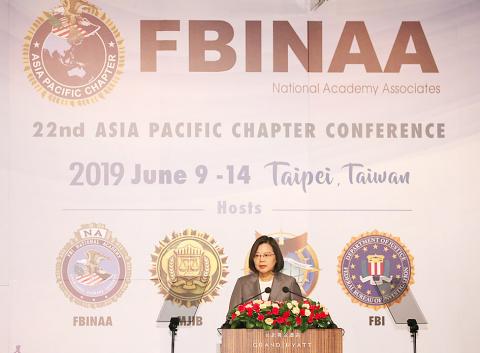President Tsai Ing-wen (蔡英文) and FBI Associate Deputy Director Paul Abbate yesterday opened a one-week FBI training program for senior law enforcement officers in the region, a course held in Taiwan for the first time.
The choice of Taiwan was “a testament to the nation’s importance to rule of law in the international community,” Tsai said at the launch of the FBI National Academy’s 22nd Asia-Pacific Chapter Conference.
“Taiwan is committed to achieving a free and open Indo-Pacific region,” she said. “We are working with like-minded partners throughout the world to make the region a safer and more prosperous place.”

Photo: CNA
Taiwan has signed memorandums of understanding on law enforcement with the US, the Philippines, Nauru and Palau, she said, adding that Taiwan’s intelligence-sharing networks stretch across East and Southeast Asia.
As a reliable partner and a force for good in the world, Taiwan is committed to combating international crime, she added.
Abbate told the conference that the FBI’s vision for the Indo-Pacific region excludes no one.
“We seek to partner with all law enforcement agencies that respect national sovereignty, fairness and the rule of law,” he said. “Our goal is for all nations to live in prosperity, security and liberty.”
Law enforcement must ensure that each country in the Asia-Pacific region is free to determine its own course, “even the smallest country,” said Abbate, the highest-ranking FBI official to ever visit Taiwan in an official capacity.
American Institute in Taiwan Deputy Director Raymond Greene said in his speech that despite Taiwan’s many contributions to the global community, it unfortunately is excluded from international bodies such as the WHO, the International Civil Aviation Organization and the International Criminal Police Organization (Interpol).
“In this interconnected world, Taiwan’s absence not only harms its 23 million people, but also increases risks to all countries,” he said.
That is why Taiwan’s participation in the FBI academy network is important to the world’s collective safety and security, Greene said.
This week’s conference in Taipei, which has about 170 participants from more than 20 nations, is a follow-up program for law enforcement officers who have participated in a 10-week course usually held in the US.
Officers from the Investigation Bureau and the National Police Agency have taken the course in the US since 1961, with about 36 of them graduating from the program, the Ministry of Justice said.
The FBI National Academy says it has trained more than 50,000 officers from around the world since launching its 10-week program in 1935.

CHAOS: Iranians took to the streets playing celebratory music after reports of Khamenei’s death on Saturday, while mourners also gathered in Tehran yesterday Iranian Supreme Leader Ayatollah Ali Khamenei was killed in a major attack on Iran launched by Israel and the US, throwing the future of the Islamic republic into doubt and raising the risk of regional instability. Iranian state television and the state-run IRNA news agency announced the 86-year-old’s death early yesterday. US President Donald Trump said it gave Iranians their “greatest chance” to “take back” their country. The announcements came after a joint US and Israeli aerial bombardment that targeted Iranian military and governmental sites. Trump said the “heavy and pinpoint bombing” would continue through the week or as long

TRUST: The KMT said it respected the US’ timing and considerations, and hoped it would continue to honor its commitments to helping Taiwan bolster its defenses and deterrence US President Donald Trump is delaying a multibillion-dollar arms sale to Taiwan to ensure his visit to Beijing is successful, a New York Times report said. The weapons sales package has stalled in the US Department of State, the report said, citing US officials it did not identify. The White House has told agencies not to push forward ahead of Trump’s meeting with Chinese President Xi Jinping (習近平), it said. The two last month held a phone call to discuss trade and geopolitical flashpoints ahead of the summit. Xi raised the Taiwan issue and urged the US to handle arms sales to

BIG SPENDERS: Foreign investors bought the most Taiwan equities since 2005, signaling confidence that an AI boom would continue to benefit chipmakers Taiwan Semiconductor Manufacturing Co’s (TSMC, 台積電) market capitalization swelled to US$2 trillion for the first time following a 4.25 percent rally in its American depositary receipts (ADR) overnight, putting the world’s biggest contract chipmaker sixth on the list of the world’s biggest companies by market capitalization, just behind Amazon.com Inc. The site CompaniesMarketcap.com ranked TSMC ahead of Saudi Aramco and Meta Platforms Inc. The Taiwanese company’s ADRs on Tuesday surged to US$385.75 on the New York Stock Exchange, as strong demand for artificial intelligence (AI) applications led to chip supply constraints and boost revenue growth to record-breaking levels. Each TSMC ADR represents

State-run CPC Corp, Taiwan (CPC, 台灣中油) yesterday said that it had confirmed on Saturday night with its liquefied natural gas (LNG) and crude oil suppliers that shipments are proceeding as scheduled and that domestic supplies remain unaffected. The CPC yesterday announced the gasoline and diesel prices will rise by NT$0.2 and NT$0.4 per liter, respectively, starting Monday, citing Middle East tensions and blizzards in the eastern United States. CPC also iterated it has been reducing the proportion of crude oil imports from the Middle East and diversifying its supply sources in the past few years in response to geopolitical risks, expanding